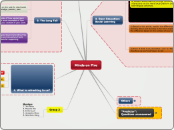Minds on Fire
2. Open Education:
Social Learning
a) Based on the article, what do you understand by social learning?
a) Evident Social Learning through conversations, enquiries, interactions via the many social platform (real and virtual) and technological advances.
Small Group networking to Class Sharing tools
Wikis, blogs, forums, discussion etc
Expanded Learners: Student + Social friends + Virtual Avatars
Extension to rural areas with no web capabilities
Available use of telescopes, microscopes and scientific tools
b) Based on the article, explain the difference between learning about and learning to be? Give examples to explain the difference based on the context of your work.
b) From "I think I am, therefore I am" to "We participate, therefore we are" and "Learn to be"
Mastering a field of knowledge involves not just "learning about" the subject but "learning to be" a full participant in the field.undefined
Illustration
When young, you learn about many occupations, e.g. doctor, teacher, policeman.
When you inspire to become a doctor, you will immerse into the field of practices.
Applications
Learning to be: COP
Learning about: eSILKundefined
Others
Evident Social learning through conversations, enquiries, interactions via the many social platform (real and virtual) and technological advances.
Small Group networking to Class Sharing tools
Wikis, blogs, forums, discussion etc
Expanded Learners: Student + Social friends + Virtual Avatars
Extension to rural areas with no web capabilities
Available use of telescopes, microscopes and scientific tools
Free access for all to multiple e-courses, materials, expert fields and resources.
From "I think I am, therefore I am" to "We participate, therefore we are" and "Learn to be"
Mastering a field of knowledge involves not just "learning about" the subject but "learning to be" a full participant in the field.undefined
Novice and expert participation in various interest/specialised fields
Eevryone can learn from everyone through comments, gaps, quality and crtiques.
Control measures needsed to ensure quality of such forums, such as Experts as administrators.
Light: Group studies = better engaged, better prepared and better learning
"Predictor":
Questions unanswered
Accessibility to all?
Language of Web 2.0 is not all English-based?
Web 2.0 onto mobile platforms?
Intellectual Property??
Profit / Losses for Educational Centres
Need to re-think how to sustain such centres?
Is Web Learning >> Classroom Learning??
Loss of social and inter-personal skills and EQ?
CyberSlacking?
Assessment of Learning 2.0
Learning and Application is different. Context needs to be taken into considerations when solving problems.
e.g. I learn new media in this course, but I may not be able to apply even one tool in my area of work.
1. What has changed?
A "flatter" World
Faster pace of change
Multiple careers
3. The Long Tail
Real World Commerce: 20% of Titles = 80% of sales
e-Commerce: We sold more books today that didn't sell at all yesterday than we sold today of all the books that did sell yesterday.undefined
Inumerable learning opportunities on the web for distributed cognitive apprenticeship, deep knowledge, passion, peer learning and interest.
c) Based on the article, give examples of how people learn using Web 2.0/new media. Provide some examples of how these examples can be applied to your context of your work.
c) Emergence of Learning 2.0 - it goes beyond providing free access to traditional course materials and educational tools and creates a participatory architecture for supporting communities of learners.undefined
Examples of New Media
Wikis, blogs, forums, discussion, social network etc
Applications
Knowledge transfer and collaboration in Training Institutes via LEARNet platforms, i.e. blogging, journaling, reflection, feedback.
4. What is refreshing to us?
Acquiring new knowledge at a constant pace
Demand-pull from Supply-Push
Learning 2.0 in Web 2.0
Group 3
Members
1. Jon Pang
2. Pauline Teo
3. E Von Lum
4. Jordache Chan
5. Neo Kian Heng
